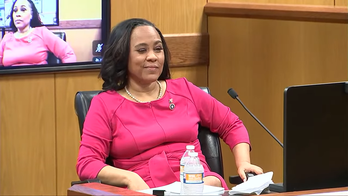Stimulus stalemate: Coronavirus bill has Congress caught in temporal loop
Congress is stuck repeating the same thing over and over again each day; Chad Pergram reports from Capitol Hill.
Senate Republicans reportedly plan to renew the push for a coronavirus stimulus deal with the introduction of a slimmed-down aid package amid a weeks-long impasse between the White House and top Democrats.
The smaller GOP relief bill is expected to include $300 in extra weekly federal unemployment benefits until December 27, another tranche of money for the Paycheck Protection Program and an additional $10 billion for the U.S. Postal Service and liability protections, according to Politico, citing two GOP sources. The proposal would also allocate additional funding for schools and education.
WHITE HOUSE, DEMS 'MILES APART' OVER VIRUS AID PACKAGE, PELOSI SAYS
The revised measure would represent a scaled-back version of the $1 trillion HEALS Act introduced by Republicans at the end of July. But the new proposal notably does not include a second $1,200 stimulus check for American families, unlike the HEALS Act.
Both parties indicated last week that an agreement is still out of reach after days of no in-person meetings, signaling the stalemate over the next rescue bill could drag into September.
One of the biggest points of contention between the parties is the cost of the proposal. Democrats have offered to come down $1 trillion from the roughly $3 trillion HEROES Act, which the House passed in May. But the White House and Republican leaders want to keep the price tag closer to $1 trillion amid growing concerns over the nation's ballooning deficit.
Democrats are now saying they will only sit down with Republicans if they agree to a $2 trillion price tag.
Asked last week when she thought she might speak with Republicans again, Speaker Nancy Pelosi told reporters: "I don’t know. When they come in with $2 trillion."
WASHINGTON IMPASSE ON CORONAVIRUS RELIEF THREATENS US ECONOMY
Treasury Secretary Steven Mnuchin has called the $2 trillion figure a "non-starter," and has urged Democrats to return to the bargaining table and compromise on a $1 trillion package.
"My view on negotiations is you agree on the things that you can agree on, half legislation that's good for the American public, and then come back for another bill," Mnuchin told FOX Business last week.
Most Senators returned to their home states on August 6 and are not scheduled to return until Labor Day; there have been no signs that Senate Majority Leader Mitch McConnell plans to call back the senators to vote on the legislation.
Lawmakers will be given 24 hours notice if they need to return to the Capitol to vote on a deal.
During a news conference in Kentucky on Monday, McConnell said he remained hopeful the two sides can strike a deal, but did not guarantee the possibility of one.
“I can’t tell you with certainty we’re going to reach an agreement,” he said.
SECOND STIMULUS CHECK MAY NOT GO OUT UNTIL SEPTEMBER AS RELIEF TALKS DRAG ON
House lawmakers recessed at the beginning of August, but are slated to return to Washington for a rare Saturday vote on legislation that would provide $25 billion in funding to the cash-poor U.S. Postal Service.
President Trump, facing a deadlocked Congress, issued a series of executive actions last week that he said would address the economic fallout from the pandemic.
The measures would postpone the collection of payroll taxes for individuals earning less than $104,000 annually through the remainder of the year; partially restore supplemental unemployment benefits at $400 per week (25% of which would come from cash-strapped state's budgets), extend student loan relief and discourage evictions.
Trump has vowed to forgive any taxes that are deferred, but without legislation, those payments will still be required by the delayed due date.
CLICK HERE TO GET THE FOX NEWS APP
Some of his proposals are expected to face legal challenges. The Constitution gives Congress the power of federal spending, meaning that Trump does not have the legal authority to issue executive orders allocating how much money should be spent on the pandemic.





